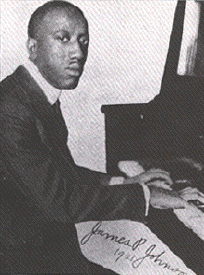
Convergence of Ragtime and the Blues 2
Listen to Morton's "Tiger Rag" . "Tiger Rag" is most significant to jazz because it is the first in the idiom that is not infused with the blues. In fact, the cheerful, upbeat character leans more toward the style of ragtime.
Stride's characteristic left-hand accompaniment evolved from ragtime and the classical piano music of the late nineteenth century. The principal differences between ragtime and stride lie in the latter's use of wider intervals in the left hand, more harmonic subtlety, greater elaboration of the melody, a stronger sense of forward propulsion, and a much fuller overall sound.
This is technically very demanding, as great accuracy is required to play the right bass notes while constantly moving the left hand up and down the keyboard; simultaneously, the right hand is called upon to create continuously interesting melodic lines and figures. The finest exponents were virtuosi, who could accomplish this at breakneck speed with effortless ease and dazzling rhythmic drive. While it was common for whole pieces to be performed in a stride style in its early years, stride evolved to become an element in the pianist's repertoire. Outstanding pianists such as James P. Johnson, William "the Lion" Smith, and Meade Lus Lewis were able to integrate it into a broader conception of jazz piano performance.

James P. Johnson
Louis Armstrong
Very few of the men whose names have become great in the early pioneering of jazz and of swing were trained in music at all. They were born musicians: they felt their music and played by ear and memory. That was the way it was with the great Dixieland Five.
Wynton Marsalis
Jazz music is the power of now. There is no script. It's conversation. The emotion is given to you by musicians as they make split-second decisions to fulfil what they feel the moment requires.






